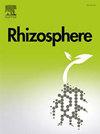Biochar improves root growth and nitrogen metabolism in tobacco through physiological pathways modulation
IF 3.4
3区 生物学
Q1 PLANT SCIENCES
引用次数: 0
Abstract
Biochar has been demonstrated to influence crop root development and nitrogen metabolism; however, its effects vary notably among different crop species. This study investigated the regulatory effects of biochar on the rhizosphere soil environment, root morphology and physiology, nitrogen metabolism-related enzymes and genes, and leaf metabolism in tobacco under field conditions. The results showed that biochar significantly enhanced tobacco root development and nitrogen metabolism efficiency. Specifically, biochar improved root vitality by 58.23%, and the activities of peroxidase and superoxide dismutase increased by 30.17% and 26.38%, respectively. Concurrently, biochar improved nitrogen metabolism efficiency by increasing soil nitrate nitrogen and ammonium nitrogen contents by 38.99% and 99.94%, respectively. Moreover, biochar treatment enhanced the activities of nitrate reductase and glutamine synthetase in roots by 28.14% and 41.87%, respectively. Additionally, biochar influenced root hormone levels, which positively affected root growth and played a critical role in regulating nitrogen metabolism. This study demonstrated that biochar modulates root development and nitrogen metabolism efficiency in tobacco through physiological changes. These findings offer valuable insights into the potential of biochar as a sustainable soil amendment to enhance crop productivity and reduce dependence on chemical fertilizers.
求助全文
约1分钟内获得全文
求助全文
来源期刊

Rhizosphere
Agricultural and Biological Sciences-Agronomy and Crop Science
CiteScore
5.70
自引率
8.10%
发文量
155
审稿时长
29 days
期刊介绍:
Rhizosphere aims to advance the frontier of our understanding of plant-soil interactions. Rhizosphere is a multidisciplinary journal that publishes research on the interactions between plant roots, soil organisms, nutrients, and water. Except carbon fixation by photosynthesis, plants obtain all other elements primarily from soil through roots.
We are beginning to understand how communications at the rhizosphere, with soil organisms and other plant species, affect root exudates and nutrient uptake. This rapidly evolving subject utilizes molecular biology and genomic tools, food web or community structure manipulations, high performance liquid chromatography, isotopic analysis, diverse spectroscopic analytics, tomography and other microscopy, complex statistical and modeling tools.
 求助内容:
求助内容: 应助结果提醒方式:
应助结果提醒方式:


